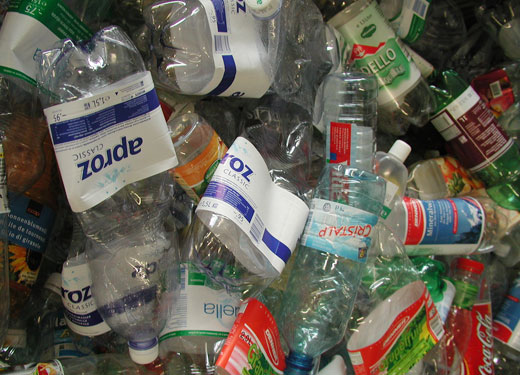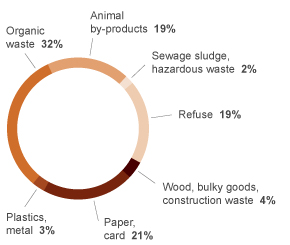
Recycle instead of burn
Migros avoids waste wherever possible: the retailer also supports its customers in the correct disposal of waste and has further expanded its collections system.
Avoiding or reducing waste wherever possible is Migros's principle for all operating procedures. Nevertheless, the businesses and cooperatives produce 200'000 tonnes of waste per year. The majority is organic waste; for example food beyond its sell-by date as well as production and cutting waste. More than two thirds of waste can be recycled today. As a result, Migros is also using more recycled materials; for instance, recycled PET in its drinks bottles.
Charts on operational waste
Composition of operational waste
Do not waste food
It is a daily challenge for Migros to offer fresh produce until closing time, while simultaneously producing as little organic waste as possible. To avoid food waste, Migros uses various strategies: first, the quantity of the products required at the branches is forecast as precisely as possible on the basis of experience and using weather models. Second, the retailer provides products that are close to their sell-by date to customers and employees at a reduced price, or – third – hands them out free of charge to aid organisations such as Schweizer Tafel or Caritas. But some leftovers still remain. Migros uses these as practically as possible: waste from industrial enterprises is used mainly as animal feed; that of the cooperatives generates power, heat, biofuels or compost in fermentation plants. Migros thereby reduces the amount of waste that is finally burnt to a minimum.
Expanded recycling system
Migros operates the biggest collection system for empty containers and used products in Swiss retailing. The shops have collection points for PET drinks bottles, PE dairy product bottles, batteries, electric and electronic appliances as well as power-saving bulbs. Specialist markets stocking the relevant ranges accept numerous other products, such as fluorescent tubes and lights, electrical DIY, garden and hobby equipment, and paint and varnish. Customers have also brought back increasing quantities of recyclable material to stores over the past few years. In 2010 Migros collected approx.13'000 tonnes of waste for recycling. Handling waste correctly is not only an important topic for Migros for environmental reasons: collected goods and waste are resources with which Migros also achieves economically efficient management.
Chart on customer returns
Pilot projects completed
Switzerland leads Europe when it comes to collecting recyclable materials. But the system can nevertheless be developed further. Migros made a contribution to this and was the co-organiser of an expert conference that aimed to discuss the future of separate collections with other stakeholder groups. The momentum from these debates was included in a study by the Swiss retail stakeholder group IG ((links to list of partnerships)). Migros has also worked specifically on expanding the collections system. The Lucerne cooperative, for instance, has successfully completed a pilot project: since 2009, customers have been able to dispose of other PE containers in addition to white milk bottles, such as bottles of shower gels, cleaning agents and cosmetics products. The expanded PE collection has been a resounding success and Migros Lucerne will certainly continue it. The retailer has also expanded its CD recycling initiative. The pilot project was started in 2009 at three test branches. By the end of 2010, 37 branches in the Eastern Switzerland test region had integrated CD slots in their collection points. Last year the collections point network was also expanded by larger branches in the German-speaking part of Switzerland and in Ticino. By the end of 2010, 74 Migros branches had been equipped with CD collection points. Migros customers have so far returned about 100'000 data carriers, corresponding to some 1.5 tonnes of recyclable polycarbonate (for more information, see www.cd-recyling.ch).
A joint effort for clean roads
Jointly with Swiss retail stakeholder group IG DHS and environmental group IGSU ((links to list of partnerships)), Migros is supporting the public authorities in numerous projects for clean public spaces. At the third round table of the Swiss Federal Office for the Environment (FOEN) on the topic of littering, Migros again participated in the constructive dialogue with public institutions and other organisations affected in 2010. In addition to providing collection infrastructures at the branches and varied logistics services, Migros is committed to combating litter with voluntary measures, in particular. This involves, for instance, tidying public spaces, emptying bins at the entrances of branches and funding the collection of PET bottles and aluminium in public spaces with advanced recycling contributions. But Migros also aims to raise awareness of the population. As such, apprentices from Migros and other retailers were made aware of the problem last year in Basel with 20 humorous works of art made from waste. A waste campaign day under the motto of Zäme für ä suubers Dorf [Together for a clean village] was held in Wald (ZH) with the support of Migros.